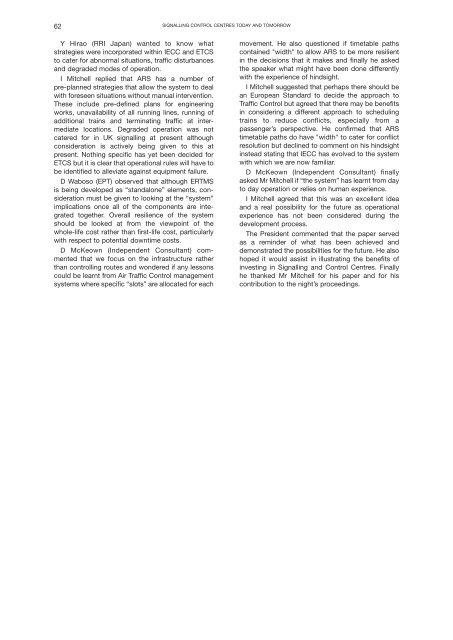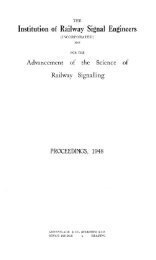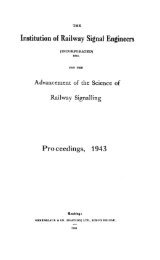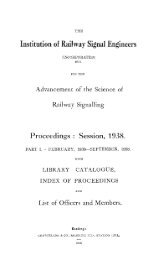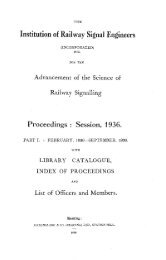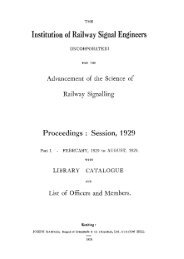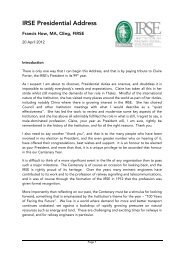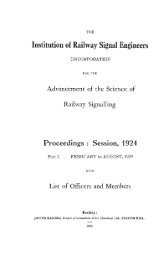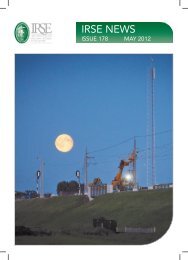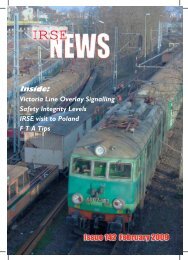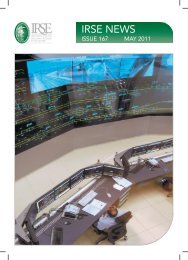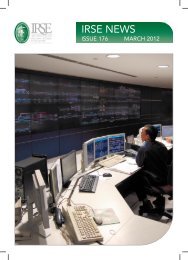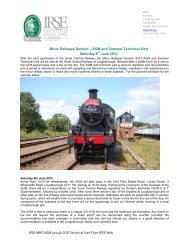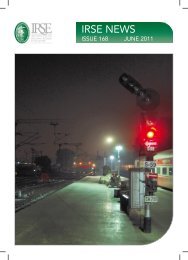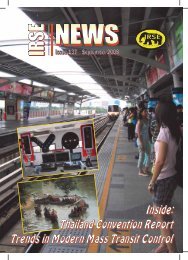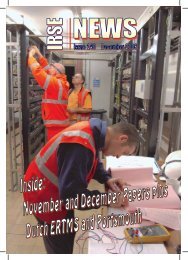Proceedings 2002/2003 - IRSE
Proceedings 2002/2003 - IRSE
Proceedings 2002/2003 - IRSE
Create successful ePaper yourself
Turn your PDF publications into a flip-book with our unique Google optimized e-Paper software.
62<br />
SIGNALLING CONTROL CENTRES TODAY AND TOMORROW<br />
Y Hirao (RRI Japan) wanted to know what<br />
strategies were incorporated within IECC and ETCS<br />
to cater for abnormal situations, traffic disturbances<br />
and degraded modes of operation.<br />
I Mitchell replied that ARS has a number of<br />
pre-planned strategies that allow the system to deal<br />
with foreseen situations without manual intervention.<br />
These include pre-defined plans for engineering<br />
works, unavailability of all running lines, running of<br />
additional trains and terminating traffic at intermediate<br />
locations. Degraded operation was not<br />
catered for in UK signalling at present although<br />
consideration is actively being given to this at<br />
present. Nothing specific has yet been decided for<br />
ETCS but it is clear that operational rules will have to<br />
be identified to alleviate against equipment failure.<br />
D Waboso (EPT) observed that although ERTMS<br />
is being developed as “standalone” elements, consideration<br />
must be given to looking at the “system”<br />
implications once all of the components are integrated<br />
together. Overall resilience of the system<br />
should be looked at from the viewpoint of the<br />
whole-life cost rather than first-life cost, particularly<br />
with respect to potential downtime costs.<br />
D McKeown (Independent Consultant) commented<br />
that we focus on the infrastructure rather<br />
than controlling routes and wondered if any lessons<br />
could be learnt from Air Traffic Control management<br />
systems where specific “slots” are allocated for each<br />
movement. He also questioned if timetable paths<br />
contained "width" to allow ARS to be more resilient<br />
in the decisions that it makes and finally he asked<br />
the speaker what might have been done differently<br />
with the experience of hindsight.<br />
I Mitchell suggested that perhaps there should be<br />
an European Standard to decide the approach to<br />
Traffic Control but agreed that there may be benefits<br />
in considering a different approach to scheduling<br />
trains to reduce conflicts, especially from a<br />
passenger’s perspective. He confirmed that ARS<br />
timetable paths do have "width" to cater for conflict<br />
resolution but declined to comment on his hindsight<br />
instead stating that IECC has evolved to the system<br />
with which we are now familiar.<br />
D McKeown (Independent Consultant) finally<br />
asked Mr Mitchell if “the system” has learnt from day<br />
to day operation or relies on human experience.<br />
I Mitchell agreed that this was an excellent idea<br />
and a real possibility for the future as operational<br />
experience has not been considered during the<br />
development process.<br />
The President commented that the paper served<br />
as a reminder of what has been achieved and<br />
demonstrated the possibilities for the future. He also<br />
hoped it would assist in illustrating the benefits of<br />
investing in Signalling and Control Centres. Finally<br />
he thanked Mr Mitchell for his paper and for his<br />
contribution to the night’s proceedings.


